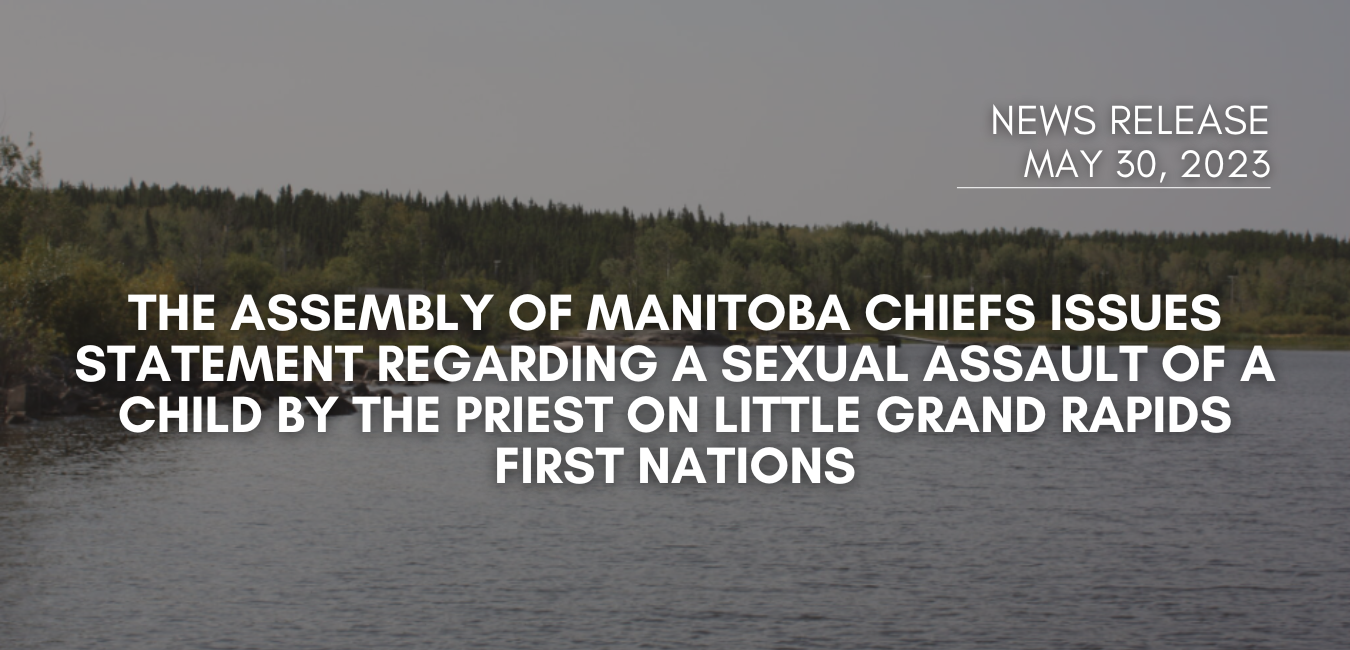The Assembly of Manitoba Chiefs Issues Statement Regarding a Sexual Assault of a Child by the Priest on Little Grand Rapids First Nations

May 30, 2023
Treaty One Territory, Manitoba
AMC Communications
Treaty One Territory, Manitoba – The Assembly of Manitoba Chiefs (AMC) issues this statement after the Royal Canadian Mounted Police (RCMP) announced their investigation of a trusted priest in Little Grand Rapids First Nations. A child has been sexually assaulted by Arul Savari, a priest who frequently visited the Little Grand Rapids First Nation and Pauingassi First Nation for the past six years. RCMP officers report a high probability of there being more victims.
The trauma experienced by these youth victims by a person they trusted in their First Nations affects the whole person and causes significant long-term stress,” said Grand Chief Cathy Merrick. “This betrayal and trauma jeopardize their ability to feel safe, to trust others again, and can lead to self-blame for the abuse they suffered, and the impact of this abuse can have long-lasting effects such as post-traumatic stress disorder. This abuse also impacts their family, friends, and community members. It affects the overall well-being of that community because we still have residential school survivors that suffered similar abuses, and this recent sexual abuse by a priest on children may be very triggering to those survivors. My heart is with the people of Little Grand Rapids and Pauingassi at this time of sorrow.”
In the past century, revelations of grave abuse by religious leaders have come to light that date back many generations, and the Church has never responded or even accepted that these horrific acts still occur. Due to this, it is common for First Nations survivors to be ignored or disbelieved, leading to shame and the inability to heal.
Violence against First Nations peoples reflects the traumatic and destructive history of colonialization that impacted and continues to impact First Nations. Experiences of violent victimization are concerning and profoundly impact outcomes such as First Nations citizens’ social, economic, and emotional well-being. However, many violent crimes against First Nations are not reported to authorities. The issue of reporting crimes such as these is impacted by the mistrust in police and the criminal justice systems. In particular, a history of colonialization and ongoing structural and systemic realities continue negatively affecting First Nations citizens and authorities in Canada.
“With these facts in mind, I would like to commend this child on her bravery and courage.” Grand Chief Cathy Merrick said, “My prayers are with her and all First Nations citizens affected by this tragedy. I also call on the Roman Catholic church to fully apologize to the people of Little Grand Rapids and Pauingassi First Nation, where he provided religious services for the past six years. The Church has always been slow to respond or accept that these horrific events still happen. The Church needs to apologize and act swiftly in denouncing Arul Savari as a representative of the Roman Catholic church and make whatever reparations necessary to the communities he took advantage of with his position of trust and authority.”
It is important that the Province of Manitoba brings charges against this priest and prosecutes him to the fullest extent of the law. AMC also calls on the Roman Catholic Church to apologize fully to the citizens of Little Grand Rapids and Pauingassi First Nations and ensure appropriate supports are provided as a result.
A national Indian Residential School Crisis Line is available to provide support for survivors and those affected. People can access emotional and crisis referral services by calling the 24-hour service at 1-866-925-4419.
Mental health counselling and crisis support is also available 24 hours a day, seven days a week through the Hope for Wellness hotline at 1-855-242-3310 or by online chat.
For more information, please contact:
Communications Team
Assembly of Manitoba Chiefs
Email: media@manitobachiefs.com
About the Assembly of Manitoba Chiefs
The AMC was formed in 1988 by the Chiefs in Manitoba to advocate on issues that commonly affect First Nations in Manitoba. AMC is an authorized representative of 62 of the 63 First Nations in Manitoba with a total of more than 151,000 First Nation citizens in the province, accounting for approximately 12 percent of the provincial population. AMC represents a diversity of Anishinaabe (Ojibway), Nehetho / Ininew (Cree), Anishininew (Ojibwe-Cree), Denesuline (Dene) and Dakota Oyate (Dakota) people.